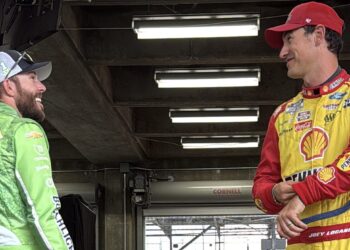In a significant development within NASCAR, 23XI Racing and Front Row Motorsports have initiated a legal challenge against the organization, alleging monopolistic practices and antitrust violations concerning the sport’s charter system. This lawsuit has intensified tensions between team owners and NASCAR’s governing body, potentially reshaping the landscape of stock car racing.
Background of the Dispute
The core of the controversy lies in NASCAR’s charter system, introduced in 2016, which guarantees 36 of the 40 starting positions in each Cup Series race to chartered teams. These charters also entitle teams to a share of the revenue generated from media rights and other sources. While the system was initially welcomed by many teams, 23XI Racing and Front Row Motorsports contend that the latest charter agreements, presented in 2024, impose unfair terms that limit their operational freedom and financial potential.
Both teams assert that NASCAR’s practices, including exclusive agreements with racetracks and restrictions on parts suppliers, stifle competition and concentrate power within the organization. They argue that these actions violate antitrust laws by creating a monopolistic environment detrimental to other stakeholders in the sport .
Legal Proceedings and Court Rulings
The legal battle commenced in October 2024 when 23XI Racing and Front Row Motorsports filed a federal antitrust lawsuit against NASCAR and its chairman, Jim France. The teams sought a preliminary injunction to allow them to compete under the 2024 charter terms while the case progressed through the courts.
In December 2024, U.S. District Judge Kenneth Bell ruled in favor of the teams, granting the injunction. The judge found that the plaintiffs had demonstrated a likelihood of success on their antitrust claims and that NASCAR’s actions could be considered monopolistic. As a result, 23XI and Front Row were permitted to operate as chartered teams for the 2025 season .
NASCAR responded by filing an appeal, arguing that the judge had misapplied antitrust principles and that the injunction undermined the organization’s ability to manage the sport effectively. The appeal is set to be heard in May 2025 .
NASCAR’s Counterclaim
In addition to the appeal, NASCAR filed a counterclaim against 23XI Racing, Front Row Motorsports, and Michael Jordan’s business manager, Curtis Polk. The counterclaim alleges that the teams, under Polk’s direction, engaged in anticompetitive behavior by attempting to organize a boycott of NASCAR events and interfere with broadcast agreements .
NASCAR contends that the charter system is essential for the stability and growth of the sport, providing teams with guaranteed starting positions and a share of the revenue. The organization argues that the actions of 23XI and Front Row threaten the viability of the system and, by extension, the future of NASCAR racing .
Implications for the Sport
The outcome of this legal dispute could have far-reaching consequences for NASCAR and its stakeholders. A ruling in favor of 23XI Racing and Front Row Motorsports might lead to significant changes in the charter system, potentially allowing for greater flexibility and competition among teams. Conversely, a decision favoring NASCAR could reinforce the current structure and affirm the organization’s authority over the sport’s operations.
Beyond the legal ramifications, the case has highlighted underlying tensions within NASCAR regarding revenue distribution, team autonomy, and the balance of power between team owners and the governing body. These issues have sparked broader discussions about the future direction of the sport and the need for reforms to ensure its long-term sustainability.
Looking Ahead
As the legal proceedings continue, all eyes will be on the upcoming court hearings and the eventual trial scheduled for December 2025. The decisions made in this case will likely set important precedents for how NASCAR operates and interacts with its teams in the years to come.
For fans and participants in the sport, the resolution of this dispute is crucial. It will determine not only the financial and operational landscape of NASCAR but also the principles of fairness and competition that underpin the sport’s integrity. The coming months will be pivotal in shaping the future of stock car racing in America.












